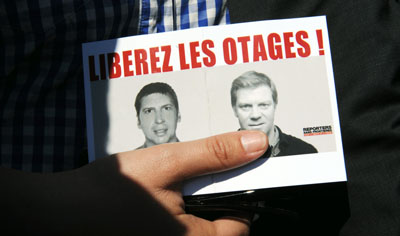Hervé Ghesquière and Stéphane Taponier, two journalists from the public television channel France 3, along with their Afghan translator, Mohamed Reza, and two assistants, Ghulam and Satar, have been held hostage for 300 days in Afghanistan.
They were kidnapped on December 29, 2009 while filming road construction northeast of Kabul in Kapisa Province. The area is patrolled by French soldiers but largely under the control of a local warlord, Gulbuddin Hekmatyar.
On Monday, the journalists’ colleagues at France Télévisions, members of their support committee, Libérez-les, and Reporters without Borders held a day of action to denounce their captivity and demand their liberation.
France 3 and Radio France Internationale (RFI) hosted a two-and-a-half hour live program where celebrities took turns expressing their sympathy for the hostages. A free concert at the Zénith de Paris featured dozens of leading media personalities, including Michel Drucker and Patrick Poivre d’Arvor, and a lineup of recording artists including Yannick Noah, Véronique Sanson and Patrick Bruel. The event was broadcast live on France 3 and relayed to Kabul by RFI and TV5 Monde, the global French-language broadcaster.
This special celebration was meant first and foremost to bring comfort to the hostages’ friends and families. Organizers also hoped that the event, which was translated into Farsi and Pashto and broadcast on the Internet, might reach Hervé, Stéphane and their fixers in their captors’ Afghanistan hideout.
Beyond the show of solidarity, other issues loomed large, in particular the delicate and at times very tense relationship between French journalists and authorities.
In January, news of the kidnapping sparked a heated debate between the press and the government. President Nicolas Sarkozy allegedly expressed his irritation at what he called the “guilty” imprudence of the two reporters via a French radio station. A French general raised the issue of how much a search for the hostages would cost the military.
In the first weeks of the drama, the directors of France 3 also appeared hesitant. They refrained from publicizing the names of the two journalists until April, arguing that the secrecy would better guarantee their safety. Many in the media, however, felt that this attitude looked like a disavowal of two seasoned journalists who had reasonably assessed the risk of their trip and met with bad luck.
From the beginning, French journalists knew that the stakes were high. Beyond their campaign to help free their colleagues, they conceived their mobilization as a test to establish the legitimacy and independence of their work in war zones and push back against the government’s argument that journalists should embed themselves with military units and march in lockstep.
The 300 days of captivity have been hard on the hostages and their friends. Hopes have been raised and then dashed. Yet optimism was floating in the air on Monday at the Zénith. Hervé and Stéphane’s colleagues now publicly insist that the government is making the utmost effort to negotiate their liberation. The new director of France Télévisions has repeated that the fate of the two reporters and their assistants is his number one priority. A few weeks ago, despite President Sarkozy’s call for patience, a French general hinted that the two hostages and their fixers might be freed “before Christmas.”
Buoyed by the solidarity of the celebrities and private citizens who flocked to the Zenith on Monday night, it’s easy to imagine that Hervé and Stéphane’s friends could finally see an end to their nightmare. How would that homecoming unfold? A ministerial plane would land at a military airport close to Paris. The doors would open. The men would descend the stairs to meet their families, their friends, their colleagues…and perhaps even the president of the republic.
(Reporting from Brussels)
